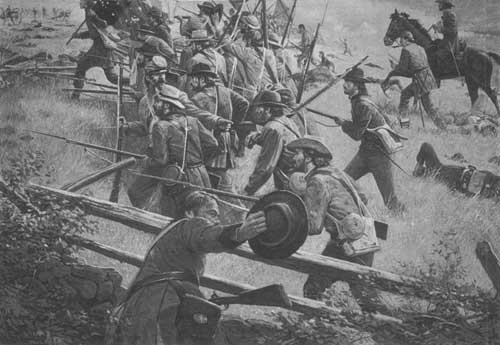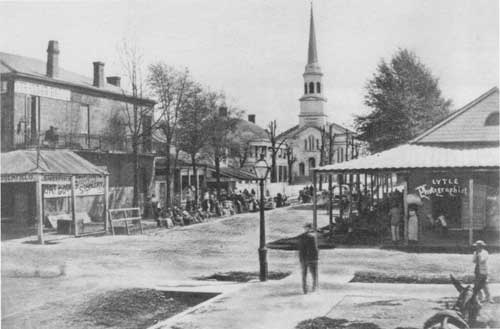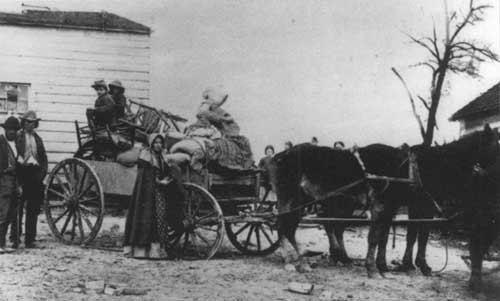|
THE SOUTHERN HOME FRONT
The willingness of the planter class to donate all, including loved
ones and family members, to the Confederate cause has become a part of
Civil War folklore. Indeed, there are many examples of aristocratic
parents—those who could well have afforded to pay for
substitutes—coaxing sons to war. Evidence abounds that southern
patriotism and a sense of honor spurred the wealthy elite into action.
Equally poignant, many families were devastated by the painful divides
the war provoked. Septima M. Collis reported in her memoir: "I never
fully realized the fratricidal character of the conflict until I lost my
idolized brother Dave of the Southern army one day, and was nursing my
Northern husband back to life the next."

|
CITIZENS GATHER AT THE HANOVER JUNCTION RAILROAD STATION AND WAIT FOR
NEWS OF THE BATTLE. (LC)
|
Despite the threat of divided loyalty, Confederate nationalism
prevailed and rabid chauvinism flourished among the landed gentry. One
Selma belle broke her engagement because her fiance did not enlist
before their proposed wedding day. Support for the rebellion created a
strange mix of symbols and images for southern whites. Confederate
manhood demanded prolonged separation from the glorified household and,
ironically, absence from those very loved ones men pledged to protect.
But by individual forfeit, all households might be protected, so private
gain was sacrificed to the collective good.

|
RECRUITING IN THE SHENANDOAH VALLEY FOR
ENLISTMENT IN THE CONFEDERATE AMRY. (FW)
|
The South nurtured extremity and zeal, encouraging the press to
promote stories of female vigilance. The Raleigh Register
reported an incident in September 1863: "A young lady was engaged to be
married to a soldier in the army. The soldier suddenly returned home.
'Why have you left the army?' she inquired of him. 'I have found a
substitute,' he replied. 'Well, sir, I can follow your example, and
find a substitute, too. Good Morning.' And she left him in the middle of
the room, a disgraced soldier." Women might be sentimental, but they
could not let fears and personal concerns interfere with the Confederate
cause. The weight of victory rested heavily on the plantation matrons'
shoulders.
Virginian Margaret Junkin Preston described her husband's letters
home: "Such pictures of horrors as Mr. P. gives! Unnumbered dead Federal
soldiers cover the battle field, one hundred in one gully, uncovered and
rotting in the sun, they were all strewn along the roadside. And dead
horses everywhere by the hundred. Hospitals crowded to excess and loath
some beyond expression in many instances. How fearful is war! I cannot
put down the details he gave me, they are too horrible,"

|
EQUIPMENT BY W. L. SHEPPARD. DEPICTION OF THE ELABORATE
PREPARATIONS MADE FOR DEPARTURE INTO THE CONFEDERATE ARMY. (MC)
|
Mothers and wives, despite melancholy, rose to the occasion. In
Montgomery, Alabama, southern matrons formed a Ladies Hospital
Association in the early months of 1862. Sophia Gilmer Bibb, an
industrious widow, organized women of the town to donate supplies, staff
a hospital, and remain on call to take care of wounded soldiers and
prisoners. Women in Columbia, South Carolina, transformed the state
fairgrounds into a hospital, and the state college in town soon became a
medical facility as well. One of the most famous Confederate nurses,
Sally Tompkins, left her family plantation, Poplar Grove, to run a
hospital in Richmond. Twenty-eight and unmarried when the war broke out,
Tompkins was a devoted patriot. Her administration of the Robertson
Hospital won her Confederate fans, including Jefferson Davis, who
awarded her a military commission as "captain." Tompkins accepted her
rank but refused a salary. Phoebe Pember, a socially prominent Jewish
widow, superintended Chirimborazo Hospital in Richmond. Juliet Hopkins,
wife of the chief justice of Alabama, performed such feats that she
became known as the "Angel of the Confederacy." Wounded on the
battlefield in May 1862, she spent the rest of her life with a limp from
her wartime injury.

|
THE RETREAT INTO RICHMOND FROM THE BATTLEFIELD AT SEVEN PINES.
(BL)
|

|
SABRES AND ROSES BY DALE GALLON SHOWS J. E. B. STUART (2ND FROM
LEFT) AND TROOPS SAYING FAREWELL TO SOUTHERN CITIZENS BEFORE EMBARKING
FOR BATTLE. (COURTESY DALE GALLON HISTORICAL ART, GETTYSBURG, PA)
|
Many genteel women were exposed to scenes of ghastly horror when they
went into hospital service. Kate Cumming of Mobile described a typical
scene in April 1862: "The men are lying all over the house on their
blankets, just as they were brought from the battlefield. They are in
the hall, on the gallery, and crowded into very small rooms. The foul
air from this mass of human beings at first made me giddy and sick, but
I soon got over it. We have to walk, and when we give the men anything,
kneel in blood and water." Ladies braced themselves as they marched off
to do their patriotic duties but still reeled from their exposure to
such harsh, taxing conditions.
Wealthy men were expected to make even more dramatic sacrifices as
they donned uniforms to counter the stereotype of a "rich man's war,
poor man's fight." Several units demonstrated the patriotic loyalty of
the planter class, such as the Magnolia Cadets in Selma, Alabama, manned
entirely by local gentry. The privileged elite argued that class lines
blurred during this time of crisis. As one Alabama woman described, "We
were drawn together in a closer union, a tenderer feeling of humanity
linking us all together, both rich and poor."
While white men marched off to war, white families and slaves were
expected to keep the plantation fires tended. Indeed, the planting of
crops was considered a civilian priority, the backbone of Confederate
strategy. Women and slaves were enlisted in this effort to make the
blockaded nation economically self-sufficient. Slave owners and small
farmers alike were warned to "plant corn and be free or plant cotton and
be whipped."
With the onset of war, planters curbed their cotton production,
cutting output in half between 1861 and 1862. Sugar planters, indigo
planters, and other producers of cash crops were encouraged to curtail
production in favor of raising foodstuffs. However, a small group of
planters, who wanted to keep slaves profitable, were willing to trade
with shady speculators and continued to warehouse and smuggle large
cotton crops. Some, like Mississippian James Alcorn, saw the war as a
boom time: "I can in five years make a larger fortune than ever; I know
how to do it and will do it." Alcorn indeed made a killing in
cotton.
Trying to keep slaves in order, trying to conduct agricultural and
commercial activities during wartime disruption, absorbed the entire
planter class. It is safe to say that on the home front, planters faced
a long, slow defeat, like water on a rock, steadily wearing away.

|
SOUTHERN CITIZENS OUTSIDE THEIR HOME ON CEDAR MOUNTAIN, VIRGINIA. (LC)
|
The war turned power relations upside down on the home front. Kate
McClure, a plantation mistress left behind in Union County, South
Carolina, tired of the incompetence of her husband's overseer, Maybery,
while McClure was away at war. She fired the hapless Maybery and
deputized a slave, Jeff, to manage the work force. Indeed, the war
offered many women the opportunity to exert more influence over
plantation affairs, a challenge that many failed to embrace
enthusiastically. They might gain some satisfaction from a job well
done, but most mistresses were preoccupied with the dire straits of the
southern wartime economy. Few escaped the melancholy dread of losing one
or more family members to war.
Most southern plantation mistresses were trained to manage the
planting operations. As the wives of wealthy men who served on the bench
and in the legislature, they endured husbands' frequent and lengthy
absences. The war, however, presented a different dilemma to mistresses
left behind. Now they were faced with the possibility that their loved
ones might not return—something rare in peacetime but all too
common in war. Additionally, the threat of northern invasion undermined
slave owners' authority, and most women found themselves not worried
about prosperity but about survival as the war wore on. This crisis
weighed heavily on planter wives, increasing their burdens as defeat
seemed more and more inevitable.
The popular press advised ladies to elevate the sagging spirits of
menfolk by throwing themselves into good works to help the Confederacy.
Young girls buoyantly welcomed the challenge.
|
The popular press advised ladies to elevate the sagging spirits of
menfolk by throwing themselves into good works to help the Confederacy.
Young girls buoyantly welcomed the challenge. Judith McGuire confessed:
"Almost every girl plaits her own hat, and that of her father, brother,
and lover, if she has the bad taste to have a lover out of the army,
which no girl of spirit would do unless he is incapacitated by sickness
or wounds." Such rhetoric exalted and enforced Confederate fervor, while
stomping out dissent.
Wives and mothers, becoming more and more aware of the sacrifice such
campaigns entailed, responded in time with misgivings to the call to
arms. Alabama bride Mary Williamson cried over her husband's departure
to the army: "This great sorrow makes me forget I ever had such a
feeling as patriotism." Confederate ladies refrained from any public
displays that might be interpreted as disloyalty. The wife of the most
revered soldier within the South, Mrs. Robert E. Lee, confided in a
letter to her child: "The prospects before us are sad indeed as I think
both parties are wrong in this fratricidal war." Whatever feelings she
had in private, Mrs. Lee conveyed total support of her husband, as a
friend commented: "I never saw her more cheerful, and she seems to have
no doubt of our success." This split between the public and private
aspects of women's feelings was prevalent among women of the planter
class.
Confederates celebrated the ethic of self-sacrifice, like the matron
who proclaimed, "We are ready to do away with all forms of work and wait
on ourselves." But as hard times intensified, such sentiments withered.
Many found it difficult to face the impossible dilemmas wartime
presented. One woman confessed to her diary: "The real sorrows of war,
like those of drunkenness, always fall most heavily upon women. They may
not bear arms. They may not even share the triumphs which compensate
their brethren for toil and suffering and danger. They must sit still
and endure." Too few had the luxury of merely sitting still.
Desperate times produced desperate measures. Sallie Brock, the wife
of a Confederate soldier, "was forced to go out into the woods nearby
and with my two little boys pick up fagots to cook the scanty food left
to me." Women reported giving up blankets and even cutting up carpets to
send to the army for soldiers to sleep on. Patriot Katie Miller
reported, "I told ma when provisions got so low that she couldn't
feed a passing soldier to let me know every time one comes and I would
go minus one meal for him."
Wartime papers were filled with ideas about women's sacrifice and
heroism. One patriot in Mobile urged fellow Confederates to donate
family jewels and silver. Another Alabama woman, the niece of James
Madison, advised women to sell their hair to European wigmakers and
donate profits to the government. A bounty of $2 million would be won if
all would chop off two braids apiece at the going rate. She demanded:
"Let every patriot woman's head be shingled!" Wartime hair styles
reveal that few heeded her call.
Southern plantations, which had been concerned with conspicuous
consumption before the war, switched dramatically into plants for
production—and in the case of luxury items, centers for clever
reproduction: persimmons for dates, raspberry leaves for tea leaves,
okra seeds for coffee beans, cottonseed oil for kerosene and beeswax for
candlewax. Many mistresses took to the woods, and one memoirist recalled
that the forest became "our drug stores."

|
THIS PAINTING OF THE 1ST TEXAS CHARGING AT GETTYSBURG SYMBOLIZES THE
SACRIFICE OF CITIZENS FOR THE WAR EFFORT. THEIR FLAG WAS MADE FROM A
WEDDING DRESS. (COURTESY DALE GALLON HISTORICAL ART, GETTYSBURG, PA)
|
The search for necessities preoccupied most Confederate housewives,
and letters are filled with complaints and advice concerning quinine,
food, and other valuables. Pooling resources was important. Women in
cities were especially hard-pressed, and most stood in long lines for
bread and even flour to make bread. Charlestonian Louisa McCord Smythe
reported conditions in the blockaded port in 1863: "Food was frightfully
scarce and what there was of the coarsest description. Bacon, cornbread
made with just salt and water, and biscuits made of the wheat ground up
whole, very coarse and always with only salt and water to mix them, were
the staples, in fact the only supplies of the table. Wagons were sent
from Georgia with provisions which the town distributed to those who
came for them. For hours there would be a crowd of the best sort of
people, standing in line for their chance for a little bit of
something." In Atlanta, wartime deprivation was equally dire, as a
matron described: "I knew women to walk twenty miles for a half bushel
of coarse, musty meal with which to feed their starving little ones, and
leave the impress of their feet in blood on the stones of the wayside
ere they reached home again." One woman who confronted the price of $70
a barrel for flour exclaimed: "My God! How can I pay such prices? I have
seven children; what shall I do?" This cry echoed throughout the
Confederacy.

|
BREAD LINES IN BATON ROUGE, AS SOUTHERN SHOPKEEPERS RAN OUT OF BARE
NECESSITIES FOR THE CIVILIAN POPULATION. (LC)
|
Speculators were targeted by angry mobs. In April 1863, when a
proprietor refused to lower the price of bacon, a veteran's wife drew
her pistol and allowed fellow shoppers to "liberate" food supplies.
After the fracas, witnesses—instead of calling the
police—established a fund to provide food for indigent wives of
soldiers. Donations were solicited through the local paper.
The looting of Confederate storerooms was a problem, especially in
border states, where dissent and divides were open and flagrant. Also
the Carolina and Tennessee backcountry was plagued by desertion and
Confederate disloyalty that could and did end in bitter dispute. Where
mountain folk were embittered by planter greed and disgusted by slave
owners, mutiny ruled. In Marshall, North Carolina, rebel deserters broke
into a government warehouse to obtain salt and even raided the house of
a Confederate colonel. This set in motion a series of events which led
to vicious reprisals and the Shelton Laurel Massacre when a dozen
civilians accused of guerrilla warfare were captured and executed,
including a thirteen-year-old boy and a sixty-year-old man. The Union
campaign of starving out the rebels worked most effectively in this
interior region.
While plantations were hard hit by the war in the rural South, we
know relatively less about the way the war desiccated the lives of
ordinary people. Commonly yeoman farms were stripped of sons, mules,
tools, and other means of support, especially by the war's later years.
Women took to the fields to keep their families fed because the southern
countryside was ravaged.
Louisa Henry, anchored to her Mississippi River plantation, Arcadia,
wrote to her mother in 1862: "I feel 10 years older than when the war
commenced—and look at least five years older. I can see the change
myself and my hair is turning gray rapidly." Two years later she had
been driven off her plantation and was hiding from federals in a cottage
in the woods: "Ma, sometimes I feel almost desperate, and almost
wish I could take a Rip Van Winkle sleep till all is over and
settled."
Nineteen-year-old Amanda Worthington in Mississippi stopped writing
in her diary for a year after her brother Bert died in the war but
reflected when she recommenced: "What a change has passed over my life
since last I kept a journal! Deep have I drank of the bitter waters of
sorrow and the lightness of heart that once was mine will never return
me more."

|
SOUTHERN REFUGEES FORCED TO PACK UP AND FLEE AT THE THREAT OF UNION
INVASION. (LC)
|

|
CARTOON FROM FRANK LESLIE'S ILLUSTRATED DEPICTS THE PLIGHT OF THE
CONFEDERACY HAVING TO ROB THE CRADLE AND THE GRAVE TO FILL OUT THE
RANKS. (FW)
|
Confederate losses were enormous and devastating. The Union was
winning the war through attrition—generals in gray almost always
lost a greater percentage of their fighting force. By September 1862 the
Confederate Congress was desperate enough to push through a draft law
which raised the upper limit of conscription from the age of
thirty-five to forty-five. The government compounded the problem by
instituting the infamous "twenty Negro law" in October 1862, which
exempted any white man from army service who could demonstrate a
managerial role for twenty slaves or more—both owners and overseers
qualified. (This happened shortly before the federal government
similarly antagonized its people with a clause permitting substitutions
for $300.) Poorer farm families were outraged that planters—who
could afford service by buying substitutes—were now further
legitimated if they sat out the war. These measures coincided with
failing harvests and sparked sedition and unrest.
Within the Confederacy fewer than 5,000 men were granted government
exemptions in nineteen categories ranging from occupational emergency
(apothecaries) to physical disability (blindness, for example). And of
those exempted, only 3 percent used the "twenty Negro law." On 85
percent of those plantations where white men could prove eligibility, no
exemption was taken. Nevertheless, the perception of class privilege
rankled the populace and created a public relations disaster. Even the
$500 tax levied on exemptions, instituted in May 1863, failed to mollify
critics.
|
|
